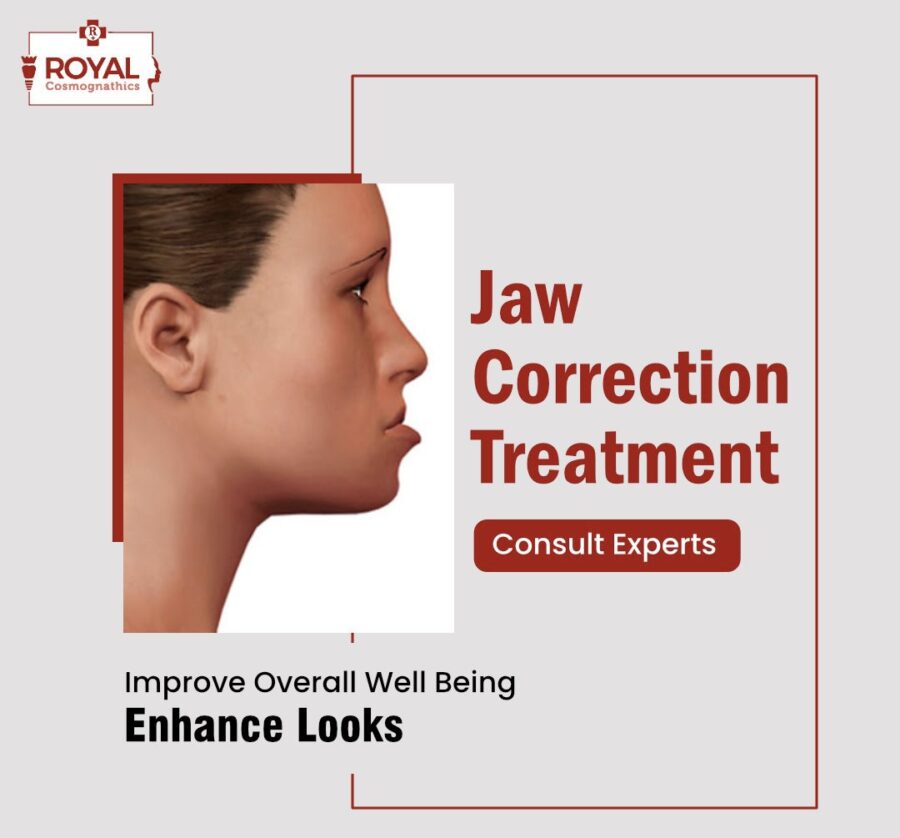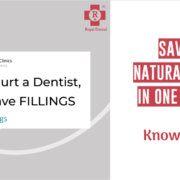A bright, confident smile can transform the way you look and feel. However, not everyone is blessed with perfect teeth and jaw alignment. If you’re struggling with bite problems, misaligned teeth, or facial asymmetry, you may benefit from Cosmognathic surgery. In this article, we’ll explore the benefits of this procedure and how Royal Dental Clinics can help you achieve the perfect smile. In this comprehensive overview, we’ll explore everything you need to know about this innovative treatment. From the basics of the procedure to the benefits it can offer, we’ll cover it all. So, if you’re ready to take the first step towards a brighter, more beautiful smile, read on to learn more about Cosmo Gnathic Surgery.
What is Cosmognathic Surgery?
Orthognathic surgery, also known as Cosmognathic surgery, involves moving the jaws and teeth into a new position to fix misalignment issues. General anaesthesia is used during the procedure, which corrects overbites, underbites, open bites, and crossbites. If you have jaw and tooth misalignments that cannot be addressed with orthodontic therapy alone, you may be a candidate for Cosmognathic surgery, which may enhance the functioning and aesthetics of your smile.
Common Dental Issues treated with Cosmognathic Surgery
Cosmognathic Surgery is a type of dental surgery that deals with the correction of skeletal and dental problems in the jaw and teeth. This surgery is recommended for people who have dental or skeletal deformities that cannot be corrected by orthodontic treatment or other dental procedures. Some of the common dental issues that can be treated with Cosmognathic Surgery include:

Malocclusion: This is a dental condition where the teeth are not aligned properly, resulting in an incorrect bite.
Jaw deformities: This condition can be caused by genetics, trauma, or injury and can affect the shape and size of the jaw.
Sleep apnea: This condition causes breathing difficulties during sleep, and it can be caused by a narrow or obstructed airway.
Types of Cosmognathic Surgery Treatments
There are several types of Cosmognathic Surgery treatments and procedures that can be used to correct dental problems. The type of surgery recommended will depend on the severity of the dental condition and the patient’s individual needs. Some of the common types of Cosmognathic Surgery treatments and procedures include:
Maxillary Osteotomy: This is a surgical procedure that involves moving the upper jaw to correct dental problems such as an open bite, crossbite, or an underbite.
Mandibular Osteotomy: This procedure involves moving the lower jaw to correct dental problems such as an overbite, an underbite, or a crossbite.
Genioplasty: This is a surgical procedure that involves changing the shape and size of the chin to improve the overall appearance of the face.
Orthognathic Surgery: This is a combination of maxillary and mandibular osteotomy procedures to correct severe dental problems.
The type of surgery recommended will depend on the specific dental problem and the patient’s individual needs. Our surgeon will discuss the best course of treatment with you during your consultation.
Benefits of Cosmognathic Surgery
Improved dental function: Cosmognathic Surgery can help to correct dental problems, which can improve chewing, biting, and speaking abilities.
Enhanced facial aesthetics: This surgery can improve the overall appearance of the face by correcting misaligned teeth and jaws.
Improved self-confidence: Correcting dental problems can have a significant impact on a person’s self-confidence, and this can improve their quality of life.
Reduced risk of dental problems: Correcting dental problems can reduce the risk of developing other dental problems such as tooth decay, gum disease, and jaw pain.


Potential Complications of Cosmognathic Surgery
Like any surgical procedure, Cosmognathic Surgery does carry some risks and potential complications. Some of the common risks and complications include:
Infection: There is a risk of infection following any surgical procedure, and this can be treated with antibiotics.
Bleeding: There may be some bleeding following the surgery, and this can usually be controlled with medication.
Pain and discomfort: Patients may experience some pain and discomfort following the procedure, but this can usually be managed with pain medication.
Numbness or tingling: There is a risk of nerve damage during the surgery, which can result in numbness or tingling in the face or mouth.
Preparing for Cosmognathic Surgery
Preparing for Cosmo Gnathic Surgery with Dr. Chirag Chamria at Royal Dental Clinics is an important step to ensure that your procedure goes smoothly and that you have a successful recovery. Here are some specific tips to help you prepare for your surgery with Dr. Chamria:
Consultation and Evaluation: Schedule a consultation with Dr. Chirag Chamria at Royal Dental Clinics. During this appointment, he will evaluate your condition and discuss your options for treatment. He will also provide you with information on what to expect during the surgery and how to prepare for the recovery process.
Medical History: Provide Dr. Chamria with a detailed medical history, including any medications you are currently taking, previous surgeries, and any health conditions you have. This information is important to ensure that the surgery is safe and effective.
Dental Checkup: Dr. Chamria may recommend that you undergo a dental checkup before the surgery. This will ensure that your teeth and gums are healthy and free from any infections or other issues that could interfere with the surgery.
At Royal Dental Clinics, Dr. Chirag Chamria and his staff are committed to being there for you every step of the way.
Medications and Supplements: Dr. Chamria will provide you with instructions on what medications and supplements to avoid before the surgery. This may include blood thinners, aspirin, and herbal supplements, as these can increase the risk of bleeding and other complications.
Smoking and Alcohol: If you smoke or drink alcohol, it is important to quit at least two weeks before the surgery. Smoking and alcohol can interfere with the healing process and increase the risk of complications.
Plan for Recovery: Dr. Chamria will provide you with specific instructions on how to prepare for the recovery period. This may include arranging for someone to drive you home after the surgery and stay with you for the first few days, as well as taking time off from work or school.
Recovery and aftercare instructions
Recovery from facial Surgery can take several weeks, and patients will need to follow strict aftercare instructions to ensure a successful outcome. Some of the key aftercare instructions include:
Pain management: Patients may experience some pain and discomfort following the surgery, and this can be managed with pain medication.
Dietary restrictions: Patients will need to follow a liquid or soft food diet for several weeks following the surgery.
Oral hygiene: Patients will need to follow strict oral hygiene instructions to prevent infection and promote healing.
Follow-up appointments: Patients will need to attend follow-up appointments with their surgeon to monitor their progress and ensure a successful outcome.
Frequently asked questions about Cosmognathic Surgery
Q: What is Cosmognathic Surgery?
A: Cosmognathic Surgery is a surgical procedure that aims to correct a wide range of functional and aesthetic issues related to the jaw and facial structures. This surgery involves the use of advanced techniques to reposition and realign the jaws, improving the patient’s bite, speech, and overall facial appearance.
Q: Who is a good candidate for Cosmognathic Surgery?
A: A good candidate for this Surgery is someone who is experiencing functional or aesthetic issues related to the jaw and facial structures. This may include problems with the bite, speech, breathing, or facial appearance. Your surgeon will evaluate your condition and determine if this Surgery is the right option for you.
Q: What are the risks associated with Cosmognathic Surgery?
A: As with any surgical procedure, there are some risks associated with these Surgeries. These may include bleeding, infection, nerve damage, and changes in facial sensation or appearance. Your surgeon will discuss these risks with you in detail before the surgery.
Q: What is the recovery period like after Cosmognathic Surgery?
A: The recovery period after this Surgery can vary depending on the patient and the extent of the surgery. You may experience some swelling, bruising, and discomfort in the first few days following the procedure. Your surgeon will provide you with specific instructions on how to care for yourself during the recovery period.
Q: How long does the procedure take?
A: The length of the procedure can vary depending on the extent of the surgery. Your surgeon will provide you with an estimate of how long the procedure will take during your consultation.
Conclusion
It’s possible that facial surgery is the solution you’ve been looking for, whether you’re unhappy with the way your grin looks or the way it works. If so, keep reading. At Royal Dental Clinics, we have the highly skilled specialists that are able to provide you with the smile of your dreams. If you are interested in the consultation services that we provide for Cosmognathic surgery, please get in contact with us as soon as possible.






